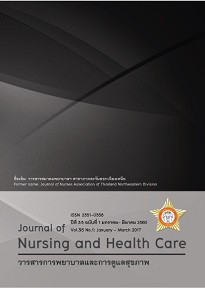การประเมินผลหลักสูตร โรคพยาธิใบไม้ตับและมะเร็งท่อน้ำดีสำหรับนักเรียนระดับชั้นประถมศึกษาปีที่ 4-6 Evaluation of Opisthorchiasis and Cholangiocarcinoma Curriculum in School grade 4-6 level
คำสำคัญ:
การประเมินผล หลักสูตรโรคพยาธิใบไม้ตับและมะเร็งท่อน้ำดี Evaluation, Opisthorchiasis and Cholangiocarcinoma Curriculumบทคัดย่อ
บทคัดย่อ
การศึกษาเชิงพรรณนานี้มีวัตถุประสงค์เพื่อประเมินผลหลักสูตรโรคพยาธิใบไม้ตับและมะเร็งท่อน้ำดีสำหรับนักเรียนระดับชั้นประถมศึกษาปีที่ 4-6 ปี 2559 ใน 4 ด้าน คือ บริบท ปัจจัยนำเข้า กระบวนการ และผลผลิต และองค์ประกอบของความสำเร็จและอุปสรรคทำการศึกษาในโรงเรียนในสังกัดสำนักงานเขตพื้นที่การศึกษาประถมศึกษาขอนแก่นจำนวน 11 แห่ง แบ่งกลุ่มตัวอย่างเป็น 2 กลุ่ม คือกลุ่มที่ 1 ได้แก่ ผู้บริหารโรงเรียน ครูที่จัดการเรียนการสอนในโรงเรียน ศึกษานิเทศก์ที่รับผิดชอบงานในพื้นที่ และเจ้าหน้าที่สาธารณสุขที่ปฏิบัติงานในรพ.สต. จำนวน71 คนคัดเลือกมาแบบเจาะจง และกลุ่มที่ 2 เป็นนักเรียนชั้น ป. 4-6 ทุกคนที่สามารถติดตามตรวจอุจจาระได้ทั้งสองครั้งในปีการศึกษา 2558-2559 จำนวน 359 คน เก็บรวบรวมข้อมูลจากแบบสอบถาม การสัมภาษณ์ และการทบทวนเอกสาร วิเคราะห์ข้อมูลใช้จำนวน ร้อยละ ค่าเฉลี่ย ส่วนเบี่ยงเบนมาตรฐาน และการเปรียบเทียบความแตกต่างของค่าเฉลี่ยก่อนและหลังดำเนินการด้วย t-test dependent
บริบท พบว่า โรงเรียนที่เข้าร่วมโครงการส่วนใหญ่ผ่านเกณฑ์การคัดเลือกร้อยละ 81.8 และโรงเรียนต้องการใช้หลักสูตร ร้อยละ 80.3 ส่วนปัจจัยนำเข้า พบว่าเจ้าหน้าที่ผู้ที่เกี่ยวข้องเคยเข้าร่วมอบรมเรื่องโรคพยาธิใบไม้ตับและมะเร็งท่อน้ำดีร้อยละ 55.2 ส่วนสิ่งสนับสนุนต่อการจัดการเรียนการสอนทั้งในส่วนของบุคคล งบประมาณ วัสดุอุปกรณ์ยังไม่เพียงพอ ปัจจัยด้านกระบวนการ พบว่า หลักสูตรผ่านกระบวนการวิเคราะห์ความสอดคล้องเนื้อหา ความจำเป็นและความต้องการส่วนกระบวนการจัดการเรียนการสอน พบว่า มีการวางแผน ร้อยละ 95.3 และมีการดำเนินการร้อยละ 88.9 ส่วนการสรุปผลและนำผลไปพัฒนาต่อไปมีเพียงร้อยละ 55.6 และร้อยละ 55.6 ส่วนผลผลิตของหลักสูตรโรคพยาธิใบไม้ตับและมะเร็งท่อน้ำดี พบว่าโรงเรียนที่มีการจัดการเรียนการสอนได้ตามที่หลักสูตรกำหนดมีร้อยละ 88.9 อัตราการติดโรคพยาธิใบไม้ตับในนักเรียนลดลงจากร้อยละ 0.8 เหลือ ร้อยละ 0.3 นักเรียนมีค่าคะแนนเฉลี่ยความรู้ การรับรู้ การปฏิบัติตนในการป้องกันควบคุมโรคพยาธิใบไม้ตับและมะเร็งท่อน้ำดีร้อยละ68.2, 88.9, 73.5 ตามลำดับ องค์ประกอบที่ทำให้ประสบความสำเร็จ ได้แก่ผู้บริหารงานในพื้นที่ให้การสนับสนุน ครูมีความรู้เรื่องโรคพยาธิใบไม้ตับและมะเร็งท่อน้ำดี การนิเทศติดตามการดำเนินงานจากหน่วยงานที่เกี่ยวข้องอย่างต่อเนื่อง และการสร้างแรงจูงใจให้กับผู้ปฏิบัติงานในพื้นที่อย่างต่อเนื่อง ปัญหาอุปสรรคในการดำเนินงาน คือ 1) เนื้อหาเรื่องโรคพยาธิใบไม้ตับและมะเร็งท่อน้ำดีไม่ได้ถูกบรรจุเป็นตัวชี้วัดในการจัดการเรียนการสอนของครู และ 2) การถ่ายทอดนโยบายลงสู่การปฏิบัติไม่ชัดเจน ส่งผลให้ครูส่วนใหญ่ให้ความสำคัญน้อย
Abstract
This study aimed to evaluate Opisthorchiasis and Cholangiocarcinoma Curriculum in school grade 4-6 in 2016. The study was conducted in 11 schools in Primary Educational Service Area, Khon Kaen .The study composed of: context, input, process product and elements of success and obstacles. The sample was divided into 2 group. The first group composed of 71 personnel from school administrators, teachers, supervisors and public health officers, selected by purposive sampling. The second group composed of 359 students in grades 4 – 6 level who provided stool examination for 2 times in 2015 – 2016. The data were gathered by questionnaires, interviews, and literature review. The data were analyzed by descriptive statistic.
Context evaluation found that 81.8% of schools which joined the project had higher standard level. The school which want to use the curriculum increase to 80.3 %. Input evaluation found that 55.2% of those personnel used to train on opisthorchiasis and cholangiocarcinoma knowledge. However, supportive aspects relevant to learning module such as budget and material were still insufficient. Process evaluation found that curriculum was conducted the process of analysis consistency content, need and demand. The process of teaching revealed that 95.3% had planning and 88.9% of the plan was taken in action. However, only 55.6 % of the plan was concluded of results and and only 55.6% of the results was applied to conduct. The product of leaning instruction of opisthorchiasis and cholangiocarcinoma curriculum in students revealed that school achieved curriculum requirement at 88.9%, and opisthorchis viverrini infection decreased from 0.8% to 0.3%. The students had mean scores of knowledge, perception, practices for prevention and control of of Opisthorchiasis and Cholangiocarcinoma, 68.2%, 88.9%, 73.5% respectively. Key success factors composed of; the support from local administration, knowledge of teacher, supervision and incentives to teacher. Barriers of this study; 1) Opisthorchiasis and Cholangiocarcinoma knowledge was not included as an teaching indicator. 2) Transfer policy into practice was unclear to encourage teacher attention.



